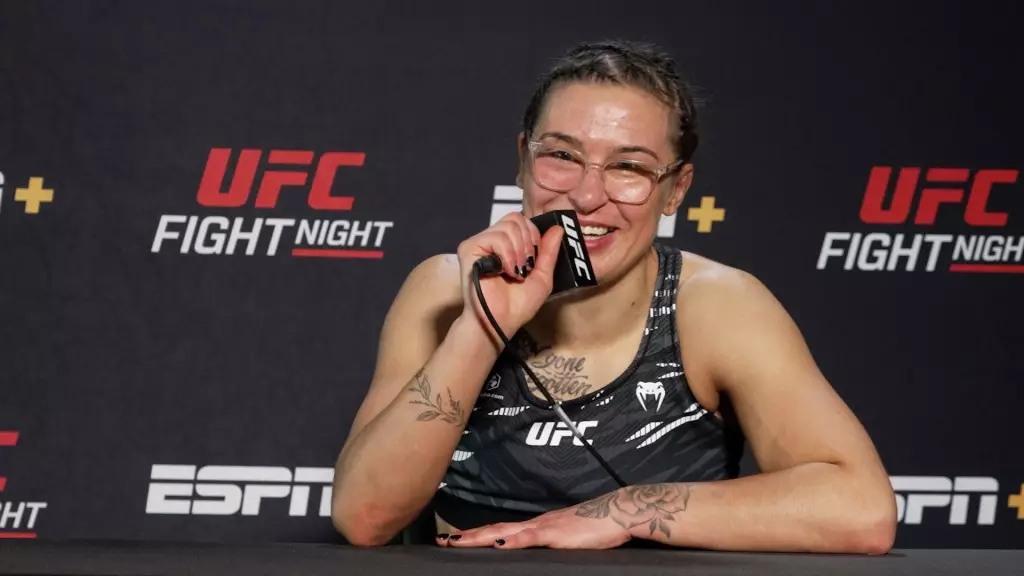In the electrifying environment of the UFC Apex in Las Vegas, fighters are always vying for recognition and a chance to ascend the ranks of mixed martial arts. On a recent Saturday night, Melissa Mullins decisively showcased her talents by defeating Klaudia Sygula with a second-round technical knockout (TKO). This victory on the preliminary card of UFC Fight Night 247 not only marked Mullins’ status as a formidable competitor but also highlighted the complex dynamics of fighting at the highest level, including the challenges of weight management and career progression.
Mullins entered the bout as a strong favorite with a betting line of 3-1 against Sygula, who was making her UFC debut on short notice. This match served as an opportunity for Mullins to solidify her place within the promotion, yet it also brought to light her recent struggles with weight. Missing the weight limit for the second consecutive fight meant she was ineligible for a post-fight bonus—an unfortunate reality for any fighter seeking to maximize their earnings and benefits from successful performances.
The Bitter Pill of Weight Management
Following her victory, Mullins shared candid reflections about her experience leading up to the fight. While she expressed immense joy over her TKO accomplishment, the frustration of not meeting the weight requirement loomed large in her post-fight interview. “It’s embarrassing… I didn’t do that,” she lamented. Missing weight, a significant hurdle for many fighters, can overshadow their achievements in the cage, leaving fighters in a precarious position regarding their contracts and future bouts.
Mullins’ experience underscores a recurring theme in mixed martial arts: the crucial importance of making weight. For fighters, this is not merely about numbers on a scale; it is an integral part of their professional identity. Athletes dedicate countless hours to training, cutting weight, and preparing mentally and physically for their matches. When that effort doesn’t translate into a successful weigh-in, it can significantly impact their careers. Mullins, despite her victory, was left grappling with the disappointment of failing in this essential part of her job.
The victory was crucial for Mullins not only as a personal achievement but also as a strategic step in her career. Emerging from a lesser-known fighter to potentially a contender only requires consistent performances and widespread visibility. In her post-fight comments, she revealed her determination to fight more regularly to ensure that she remains relevant in the sport, emphasizing, “Nobody knows who I am, so I need to take a few fights in order to build my name.” This acknowledgment reflects a keen awareness of her standing within the competitive landscape of the UFC—where fame and fan engagement can often be as vital as technical skill.
With aspirations of contending for the championship belt, Mullins is acutely aware of the steps needed to elevate her profile. Her commitment to take any fight offered to her indicates a fierce desire for growth and recognition, acknowledging the fact that frequent competition is crucial in a sport where every performance counts. Mullins’ desire to return to the octagon as soon as possible—perhaps as early as February or March—demonstrates her eagerness to capitalize on her momentum.
Mullins’ journey is emblematic of the broader struggles faced by many in the world of professional fighting. While talent and skill are invaluable assets, the myriad challenges—like weight management, public recognition, and securing regular bouts—create a complex arena in which fighters operate. Ultimately, Mullins must navigate these challenges effectively if she hopes to transcend her current status and solidify herself among the elite of women’s MMA.
Her victory over Sygula might have been just a single event in the sprawling narrative of her career, but it holds significant meaning for her future efforts in the octagon. The fight was not only a test of her physical ability but also a stage where she confronted her own limitations and pushed through them, demonstrating resilience. As she aims for more opportunities and faces down both personal and professional hurdles, the world of UFC will be watching closely to see how she develops in the coming months.

